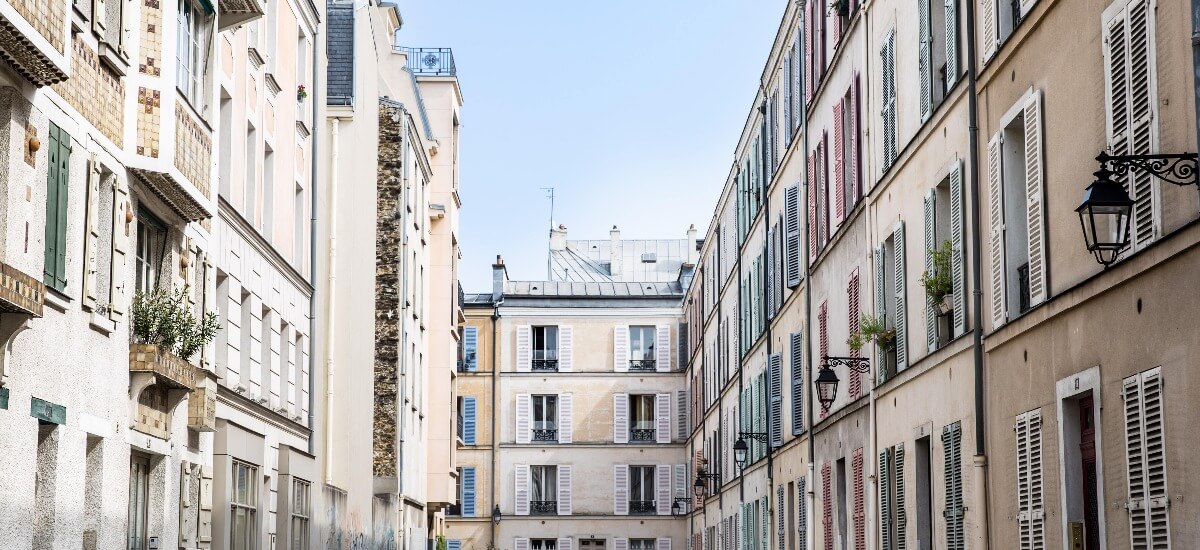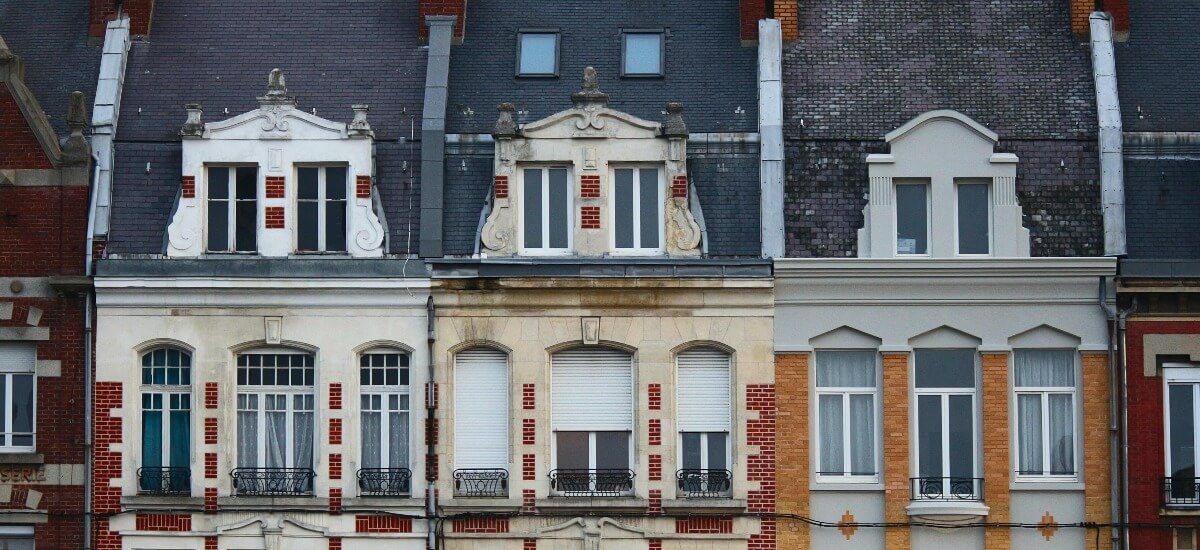How much is a security deposit? 2025 guide
Everything you need to know about security deposits

Whether you’re moving to France for work, to start a business or just to enjoy the French lifestyle, you’ve probably considered buying property to live in or as an investment.
While it seems like the French are missing out on investing in their own country — just 64.1% own their own property¹ — their reluctance to buy has left a wide market open for expats and foreign investors. And despite some tricky laws and a load of taxes, many non-residents have taken the opportunity to buy into the European country.
So if you’ve decided to buy property, what should you know in advance? This guide will walk you through the steps and key points for buying property in France.
While the French economy has not been left scatter free during the Covid-19 pandemic, the housing market is starting to pick up again².
From the second half of 2020 to mid-2021, property sales in some areas of the country began to rise again. In terms of pricing, France faces the housing prices in 10 years, with a raise of 5.85% during the first half of 2021 (4.41% when adjusted for inflation).
The tendency is that the French property market keeps strong — which brings opportunities for foreigner investors looking to buy a home in the country.
| 💡 If you’re buying international real estate you could save with Wise. Get mid-market exchange rates, schedule recurring transfers, and only ever pay low, transparent fees. |
|---|
Yes — currently there aren’t any restrictions on foreigners buying property in France³. Though for non-EU residents, such as Americans, the amount of time you will be able to spend in your new home will vary according to your residency or visa status.
Getting a home in France is, naturally, a little more difficult as a non-resident — so be aware that a lot of paperwork and due diligence will need to be done.
If you’re working with a real estate agent the process is likely to be relatively straightforward. Though it’s always a good idea to make sure you know what taxes and fees you’ll have to pay, as well as any visas you might need to enjoy your French house.
The short answer to this question is: yes. Much like purchasing property, buying land in France as a foreigner is also an possible⁴.
Since it’s likely you’ll be building your own house from scratch, you might need to look into working alongside a local — as a closer overlook might be needed directly at the construction site.
Make sure to do thorough research on the place you wish to purchase your plot of land, as there are a lot of types of soil and terrain in France.

Picking a region to live in and doing the market research to find a French home that fits your budget are great starting points to find your dream house.
But, what else do you need to do in order to turn this dream into a reality? Read along for all the steps of buying a house in France as an American³.
Step 1. Choose the region and house you wish to acquire
Step 2. Visit the property, preferably with an agent so you don’t forget to check anything
Step 3. Make your offer, verbally and via email
Step 4. Have a compromis de vente — a preliminary agreement which locks both parties into the sale — drawn by the notaire (lawyer)
Step 5. Pay for the deposit — usually 10% of the full amount of the property
Step 6. Make amendments to the contract and add clauses as needed — such as suspensives for work to be done before you move, or adding a financing option, etc.
Step 7. Pick a way to finance your property. You can opt to do it in loco with a French mortgage broker or by using an international mortgage lender in the US.
Step 8. Collect all the necessary documents, including the mortgage certificate and hand them to the notaire, so they can draw the deed
Step 9. Sign the acte authentique (sales contract) with the seller, in presence of the notaire — this is also the moment when keys are handed over and the remainder payments presented.
Step 10. Get the signatures for handing over other certificates, such as utility bills
Step 11. Wait for the land registry (cadastre)notaire - the copy of the purchase deed should be sent to you between 2-6 months after the purchase
Step 12. Enjoy your new French home 🎉
| 🏡 Maintaining your property in France: cut down on costs with Wise |
|---|
|
Setting your budget is always an important step on any real estate purchase. To help you create realistic goals and find the region that best suits your wallet, take a look at the table below.
| Location | Price (sqft) in city center | Price (sqft) outside of city center |
|---|---|---|
| Paris⁵ | 1,358.05 USD | 1,001.91 USD |
| Marseille⁵ | 333.32 USD | 278.63 USD |
| Lyon⁶ | 531.23 USD | 357.04 USD |
| Aix-en-Provence⁶ | 609.35 USD | 493.03 USD |
| Toulouse⁷ | 473.49 USD | 318.44 USD |
| Annecy⁷ | 716.11 USD | 436.44 USD |
| Nice⁸ | 662.96 USD | 495.26 USD |
Don’t forget that these are average prices and the full amount of property may vary by location within the city and it’s subject to market adjustments.
| Wondering how much that would cost in EUR? Check the handy conversion tool below: |
|---|
Another essential step for assessing your budget is knowing the fees and taxes you’ll have to pay for your new French home.
The most common fees include real estate agency, public registration and so on. But, in France, you also have the notaire (notary/lawyer) fees which are scaled by the government based on the total price of your property.
Here you’ll find a breakdown of the property fees⁹:
| Fee | Amount (%) |
|---|---|
| Public Registration fees |
|
| Value Added Tax (VAT) |
|
| Land Registry |
|
| Agency |
|
| Notary |
|
| Notaire¹⁰ |
|
| Loan registration |
|
| Exchange rate |
|
Now that we covered all the basic costs of purchasing a house in France, the only question left is: how to send money to pay for your property overseas?
Wise offers you a quick, secure and transparent way of sending money to France. You get the mid-market exchange rate for your payments and see how much it’s charged for the transfer before sending the money from your bank.
With the Wise Multi-currency Account you can also hold, send and spend money all over the world, and receive like a local in 9 different currencies.
---Create a free Wise account in minutes and see how much you can save.
We’ve been through the steps you’ll have to take to buy your home in France, to the cost of properties and fees you need to pay. But how do you find the right property for you?
The most common options when going after your property are:
- Purchasing directly from the owner
- Going through a real estate agency or agent
For finding a home to buy directly from the owner, the best way to go is using a property search website and chatting with the person that is selling.
While it may cut down on costs, the second option, of going through an agency, can expand your options, as they have access to all the properties that are available.
It’s also important to note that some French homeowners inflate prices for expats, and working with an agent can help you ensure you’re getting the best deal.
That being said, it’s not uncommon for French agencies to take up to 8% of the total cost in fees, so if you’re on a budget trying to house hunt, doing it on your own may be the best course of action.
Below you can find some real estate websites and agencies to get started with your research:
| Property websites | Agency websites |
|---|---|
No matter where you’re buying property, there’s a chance you could get ripped off.
The best way to avoid scams is to thoroughly research your agent, the property, the market in the surrounding area and what you’re entitled to as a buyer. Some common scams include:
| Outdated Diagnostic Reports |
|
| Fake Owners |
|
| Property Investment Seminars |
|
While there are many other scams out there, you can avoid many of them by visiting the property, meeting the seller or agent in person, and refusing to hand over any money before you have a verifiably working key and title in your hand.

Realistically, the types of properties you’ll find across France vary significantly by location. While in Paris you may struggle to find any housing situation outside of an apartment, in the countryside you’ll be welcomed with plots of land, sprawling estates, villas, homes and townhouses.
What type of property you invest in will depend on where you want to buy, and what makes the most sense for your family.
In France, it's the seller’s legal responsibility to provide you with an up to date diagnostic report. This should cover everything from the presence of lead, asbestos and parasites to the condition of the septic system, the Performance Energy Report and the natural disaster risk.
Before you agree to buy any property, make sure you’ve received this report and have gone over it thoroughly with your agent.
Now that we’ve been through all the information you need about buying a house in France as a foreigner, you’re ready to start finding your new home.
And, don’t forget, when paying for your fees overseas, make sure to try Wise as a quick, cheap and easy way to move your money across borders.
Sources:
Sources checked on 12.15.2021
*Please see terms of use and product availability for your region or visit Wise fees and pricing for the most up to date pricing and fee information.
This publication is provided for general information purposes and does not constitute legal, tax or other professional advice from Wise Payments Limited or its subsidiaries and its affiliates, and it is not intended as a substitute for obtaining advice from a financial advisor or any other professional.
We make no representations, warranties or guarantees, whether expressed or implied, that the content in the publication is accurate, complete or up to date.

Everything you need to know about security deposits

Learn all about different ways to get an overseas property mortgage as an American and gain unique insights to prepare yourself for the whole process.

Get a full overview of the best property management software systems for small landlords to easily track and manage their overseas property.

How to buy your first rental property overseas? Here's a detailed guide that can help you understand the challenges and steps for making an investment.

What are the best property management software systems for managing student housing? Take a look at our list and choose the most suitable option for you.

Are you thinking about making smart property investment decisions and wondering how rental yield is calculated? Have a look at our guide to find out.